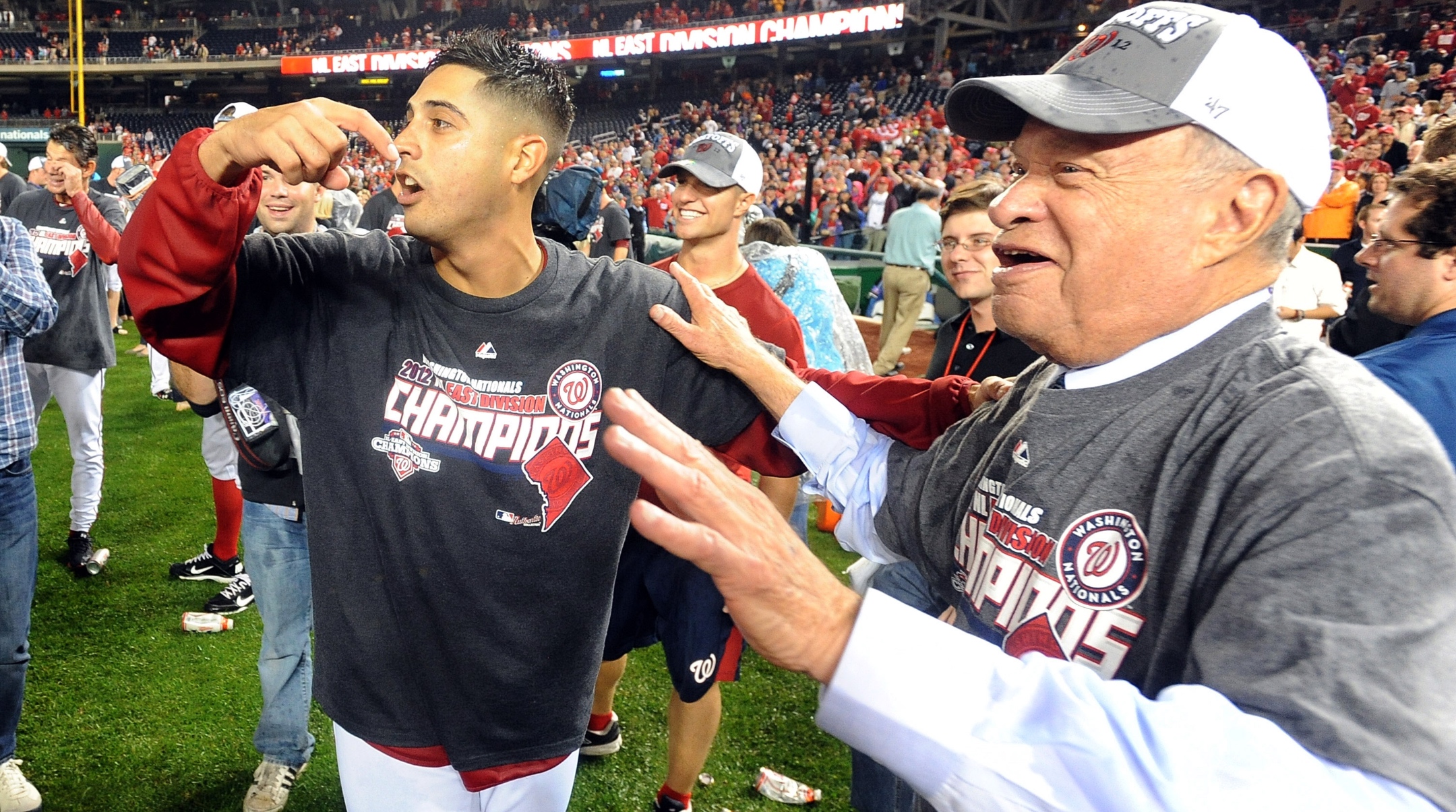Ted Lerner, real estate developer who brought baseball back to Washington, dies at 97
Ted Lerner arrived at the 2015 MLB All Stars Game with the program he annotated when he watched the game in 1937

Gio Gonzalez #47 of the Washington Nationals celebrates with owner Ted Lerner after winning the National League East Division Championship after the game against the Philadelphia Phillies at Nationals Park, Oct. 1, 2012 (G Fiume/Getty Images)
WASHINGTON (JTA) — Ted Lerner, who died on Sunday at age 97, was as famously workaholic as he was shy.
So it was a big deal when Washingtonian magazine scored an interview with him in 2007, the year after he assumed ownership of the Nationals, the first baseball team in Washington, D.C., since 1971.
In the interview, Lerner described his 18-hour days building up a real estate empire of malls and other developments that has shaped D.C. and its suburbs. He also mentioned the two things that could pull him away from his work: a ball game, and Jewish holidays.
“I just worked,” he said. “I took off for Jewish holidays and a [football] game or two.” But he said his true love was baseball, a game that brought him back to the days of his youth.
“In Washington in the 1930s, that’s all there was — baseball,” he said.
He recalled that as a teenager, he would aim to sell enough Saturday Night Evening Posts to afford the streetcar to the Senators’ Griffith Stadium (price: 3 cents) and the cheapest ticket (25 cents).
He managed to get a gig as an adolescent usher to watch the 1937 All-Star game at the stadium — “when Dizzy Dean was hit on the foot by a line drive,” he told the magazine. “He was never the same after that.” (The injury effectively ended the legendary pitcher’s career.)
When Major League Baseball decided in 2004 that the Montreal Expos’ new home would be in Washington, he secured meetings with the team’s management for himself and his heirs. His son and two daughters, and their spouses, were his sacrosanct inner circle.
Lerner did not schmooze at Major League Baseball confabs and did not mount a publicity campaign. But his seriousness led him to beat out seven other bids for the Nationals.
The payoff for that decision came in 2015, when the stadium he built to house the team hosted Washington’s first All-Star Game since 1969. Lerner brought a memento to that match: the program of the 1937 All-Star Game, with his notations scribbled in the margins.
One aspect of the job Lerner never got used to was public speaking. His high school yearbook dubbed him “Silent Ted.”
Alongside baseball, Lerner made his name by turning northern Virginia into a locus for shopping. The massive mall complex he built from dairy farms, Tysons Corner, gained international renown.
Lerner died at his home in Chevy Chase, Maryland, of complications from pneumonia. He was born and raised in Washington, D.C. to Orthodox Jewish parents. His father immigrated from British Mandatory Palestine, and his mother came from Lithuania. His extensive charitable giving included donations to the Hebrew University of Jerusalem, the U.S. Holocaust Memorial Museum and his synagogue, Ohr Kodesh.
“I never could have dreamed of owning a baseball team,” he said in 2015, receiving the Urban Land Institute Washington’s lifetime achievement award, when he contrasted his style with that of another famous real estate developer.
“And I never could have imagined over my life that I would build over 20 million square feet of commercial and residential space, and very few people would know my name,” he said. “I guess I have a different approach to real estate development than Donald Trump. And I’m fine with that.”
After he purchased the Nationals, the team continued to grow its local fan base but took years for the team to become a contender. General Manager Jim Bowden explained the strategy to Sports Illustrated in 2012.
“The Lerners made it clear: We’re not in a hurry,” Bowden said. “We want to build this through just like we build our buildings, from the bottom up. We don’t build the penthouse first.”
The strategy paid off. A year after Lerner, age 93, handed his son Mark control of the team in 2018, the Nationals won the World Series.
“There were generations of baseball fans who grew up in D.C. without a team,” Mark Lerner told The New York Times at the time. “Now they have one, and one that won a World Series. To put it into context, my father was born one year after we won the last World Series. That says it all.”
In addition to Mark and his wife, Annette, Lerner is survived by his daughters, Debra Lerner Cohen and Marla Lerner Tanenbaum, nine grandchildren and 11 great-grandchildren. His family still owns the team.
This article originally appeared on JTA.org.




















